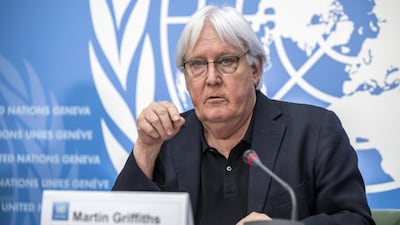Senior UN aid envoy Martin Griffiths arrived in Jeddah, Saudi Arabia, on Sunday to discuss the worsening Sudan crisis which experts fear could leave 2.5 million people without enough food and spark a wave of mass migration of nearly one million people.
Mr Griffiths, under secretary general for humanitarian affairs and emergency relief co-ordinator, was in Jeddah “to engage in humanitarian issues related to Sudan”, UN spokeswoman Eri Kaneko said.
Saudi Arabia has been working with the US and allies to secure a ceasefire since fighting began in Sudan on April 15, but rival generals Mohammed Dagalo and Abdel Fattah Al Burhan have shown little desire for compromise as the war enters its fourth week.

Riyadh and Washington have supported the “pre-negotiation talks” and urged the rivals to “get actively involved”.
A ceasefire is vital for safely moving aid into the country where health, water and electricity services have collapsed.
Mr Griffith’s visit came as the kingdom announced more than $100 million in additional aid for Sudan.
At least 700 have been killed by fighting, the majority civilians, but the actual death toll is probably far higher as fighting spreads to remote parts of the country and hospitals shut down.
In Port Sudan last week, Mr Griffiths said he had been informed by the UN's World Food Programme that six lorries bringing aid to the Darfur region had been “looted en route” on Wednesday, “despite assurances of safety and security”.
He called for security guarantees “clearly given by militaries, to protect humanitarian systems to deliver”.
Several truce deals have been declared without effect since fighting erupted on April 15 between the army and paramilitary forces in the poverty-stricken country, which has a history of political instability.
More than 100,000 people have already fled the country.
In the capital Khartoum, warplanes have bombed positions as terrified residents stay barricaded indoors trying to cope with acute shortages of water, food and medicine.
Even before the war began about one-third of Sudan's people required humanitarian assistance, the UN said.
Aid workers have been killed since the fighting began, health facilities attacked, and the UN projects that the number of “acutely food insecure people” in Sudan could increase by between two and 2.5 million if the war is prolonged.
In Jeddah, Sudanese army spokesman Brig Gen Nabil Abdalla said talks were on how a truce “can be correctly implemented to serve the humanitarian side”, while Gen Daglo, who heads the Rapid Support Forces paramilitaries, only said on Twitter that he welcomed the technical discussions.
US intelligence chief Avril Haines has warned of a “protracted” conflict that could “create a greater potential for spillover challenges in the region”.

